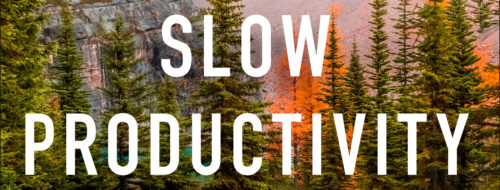It’s a tall order to make time for deep work when you’re in the thick of building relationships, but it’s worth the effort.
Part 1 of a 3-part series on the role deep work plays in fundraising. Read part 2 here, and part 3 here.
If you’re in fundraising, you can’t possibly spend hours doing deep work every day. Donors and advancement shops need quick responses! Or do they? As Cal Newport explains in his modern classic, Deep Work, the ability to focus is an increasingly rare yet highly valuable skill in the knowledge work industry. Okay, sure, but he’s an author and a college professor, and both of these professions are known to harbor eccentric personalities. Surely you can’t afford to follow the deep work model in other realms. Wouldn’t it drive donors crazy?
Interestingly, the ideas in Deep Work have received significant pushback. Readers have questioned the sustainability of such single-minded focus and raised concerns that it will damage relationships. (Cue the red flags for development offices!) However, on Newport’s podcast, Deep Questions, he clarified that he isn’t advocating for an Elon Musk-style schedule that burns bridges with the people you care about most. Instead, deep work helps you make time for quality relationships within the standard 9–5 workday.
By setting aside time to focus, instead of working in a more fragmented manner, you can ensure the important work gets done while avoiding the interruptions caused by reactive work. Reactive work can’t be ignored forever (nor should it be), but it should be divided into reasonable chunks. In keeping with this idea, deep work advocates recommend not checking your email outside of work hours or on the weekends. That might seem scary at first—what if you miss something urgent?—but in the long run, it helps fundraisers avoid the burnout that plagues our industry.
In Newport’s later book, A World Without Email, he argues that consistency trumps accessibility: if someone can trust that you’ll respond in a timely manner, they usually don’t need an instant answer. And the demand for constant accessibility can backfire. A donor might be pleased to get a fast response to their text message, but the same donor might well be offended if a development officer schedules an in-person visit with them and then is distracted by messages from other people!
Back at a nonprofit’s advancement office, the staff working behind the scenes face a similar dilemma. They have marketing materials to produce, proposals to write, and gifts to process—all tasks which would benefit greatly from uninterrupted focus. That focus goes out the window if staff are checking email every 6 minutes. (Yes, that’s a typical frequency!) But if they ignore their email, what happens when a development officer has an urgent request? Shouldn’t cultivating donors be our top priority?
Don’t panic: the value of consistency over perpetual accessibility applies not only to donor communication, but also to internal staff communication. Good processes are key. For instance, what communication channel do we use for urgent requests? That needs to be consistent across the entire team, so that everyone understands expectations and can work together effectively.
In contrast, each individual role might require a different ratio of deep work to reactive work. This isn’t to say that deep work is more important than answering the phone; they’re both essential. But it’s worthwhile to value specialization: give a writer the space they need to focus on a new draft of a proposal, while recognizing that that proposal won’t bring in a cent if support staff don’t mail it out—both roles are needed! And a nonprofit organization can’t afford to ignore the frontline information gathered by the people who open snail mail, monitor email inquiries, answer phone calls, and greet donors who show up unexpectedly.
In roles that require reactivity, the principles of deep work still apply. Doing one thing at a time rather than multitasking still results in better work and lower stress. Study after study shows that humans are far worse at multitasking than they think. Unlike computers, humans cannot switch cognitive contexts without reducing their attention capital.
When it comes to knowledge work, our goal shouldn’t be to do as many things as possible. Rather, we should focus on how to use our brains effectively without falling prey to burnout. When we’re stretched too far, both our ideas and our human empathy suffer. It won’t matter how many thank-you notes we’ve written if staff are exhausted to the point of snapping at one another or abandoning ship. The cost of working at a more sustainable pace pales in comparison to the cost of finding and training new staff, which amounts to self sabotage when it takes an average of 36 months to close a major gift. That clarity goes a long way toward avoiding blame and confusion.
We can find ways to balance focus and accessibility and cultivate relationships while protecting time for deep work. Donors deserve our full attention; proposals should be carefully crafted; gifts need to be entered accurately. And yes, someone still needs to answer the phone. We can better serve donors and our nonprofit’s mission by devoting focus to the things that matter most in each role, and we don’t have to become hermits to do so.






